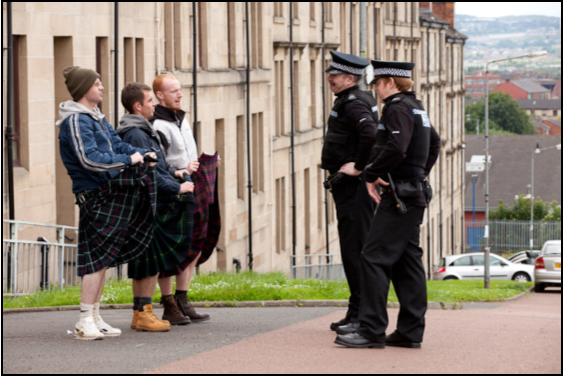On January 19th, a website for American teachers and school administrators called ‘Education Week’ published an abridged version of my blog posting ‘When Sir becomes Miss – How I Ruined my Teaching Career by Changing Gender’ on their forum ‘Finding Common Ground’. My article describes how the affirming and empowering experience of informing pupils and their parents about my transition turned sour when my employers – and the heads of other schools to which I applied – subsequently treated me in a way I can only describe as discriminatory. My professional experience post-transition led me to question the assumption that LGBT awareness-raising initiatives in schools need to be targeted at students, and my article argues that the narrowest minds and most entrenched prejudice against transgender teachers exist at the level of school management, not amongst children; it is the adults who lead schools who require the greatest support to bring reality into line with the rhetoric of inclusiveness, equality and the fulfilment of dreams that permeates their institutions’ promotional literature. I go on to suggest that the appointment practices of school leaders are conservative to the point of prejudicial, and hypothesise that this is a symptom of the machismo culture of school management, and those managers’ unimaginative response to accountability pressures from parents and national government. I wanted to embarrass school leaders to reflect on staffing decisions they make based on fear and confusion, and to observe that a diverse teaching force is necessary in order to promote tolerance and understanding amongst young people. (The most resonant factor for shaping the attitudes of adolescents is the presence of role-models who are involved in their everyday lives; when children see that their teacher cares about them, teaches interesting lessons and helps them succeed, the fact that that teacher is transgender ceases to be a social barrier.) When my article was published for an audience of American educators, it provoked a reaction that surprised me, but it wasn’t the sentiments expressed by respondents that caught me off guard (which constituted an ill-informed but predictable cocktail of old-testament nonsense and attempted social engineering). What struck me most about the comments posted in reaction to my blog was that they existed at all – that people with no apparent reason to care about a colleague’s gender history had such strong views about me. I think that the compulsion for otherwise sane people to voice bigoted opinions on matters of sex and gender is something that demands further analysis…
My original article, ‘When Sir becomes Miss’, concerned itself with the knee-jerk prejudice of teachers – people about whom, I had learned, it is wrong to assume a natural predisposition to magnanimity and tolerance. My blog stirred up a miniature furore of hectoring didacticism and gloating I-told-you-so disapproval, but if the comments posted in the wake of my blog are indicative of the attitudes of society generally, then it would seem that the image of transgender people in popular consciousness has moved on very little from pantomime dames or Victorian musical-hall drag acts. Accordingly, many subscribers to the ‘Education Week’ forum seemed unwilling to (or incapable of) conceptualising transgenderism as anything more complex than an elaborate form of dressing-up:
“If I held a series of assemblies to tell… students of my intentions to come to school dressed in a Wookiee costume (because it ‘felt right for me’) for the rest of my career, I would not have any expectations of anyone to support that.”
Wookiees were not the only under-represented group to be dragged into this game of comedic simile-making. “Would it be okay if I start dressing like a Nazi SS trooper while I teach?” one respondent asked, whilst others likened being transgender to demanding the right to come to school in a clown costume, or to “declaring myself a nature lover” in order to “go about nude” at work.
The underlying assumption of these misleading and self-satisfied swipes is that gender transition is a choice; an enactment of a fantasy to dress-up and pretend to be someone else. It is an assumption which invites two related speculations. First: whilst no-one objects to the right of another individual to play-act and put on a costume (or change gender, as I prefer to call it) per se, there was a shared belief amongst my respondents that I needed to accept that the consequences of my ‘choice’ were likely to be social isolation, rejection, and unemployment. “You make a choice, you have to live with it!” was the pithiest summation of this view, along with the pitiless admonition that I “should have known the probable consequences” of my actions, and so I “can’t complain now.” Other respondents demanded to know why I was conceited enough to “expect society to approve of your personal decision”; why it was “incumbent on the rest of the world to support your personal decision”; and why I would presume “that the twenty-first century is a time of so much freedom that people have to accept all personal choices”. I won’t cite every finger-wagging rebuke that rang with this ill-informed leitmotif, but it would be remiss of me not to share the following paragraph, which so steeped in the clichés of the Louisiana pulpit that it would be funny were it not the product of an actual human mind:
“It is you, not the kids or adults that needs to grow up and not expect society to bend themselves into pretzels to accommodate your mental problems. Get help, man! You have a wife, you are equipped as a man, you need to stay in the role. Maybe your testosterone levels have prematurely declined? Maybe you were abused as a child, or someone dressed you as a girl for their amusement? Get help!”
The second aspect of these impassioned comments that requires unpacking is, of course, the question of how much being transgender is a personal choice. When I was being lifted off the bathroom floor after collapsing in a nervous heap for the fifth Sunday in a row; when I was wiping away tears so I could read the label on a bottle of anti-depressants; when I was fighting the urge to run from my own wedding because I wanted to be the one in the dress, changing gender didn’t seem like much of choice. When I was finally lucky enough to get the emotional support I needed, my options were either to stay suicidally miserable, or change my life. Having lost so many days to depression and mania, I know how flippantly asinine it is to compare my ‘choice’ to dressing as a clown or wearing a Wookiee suit. If an analogy is needed to describe my feelings before transition, then I would suggest comparing my sense of unfulfillable longing to compulsive disorders like self-harming and anorexia; as something I needed to do in order to feel as if I had some control over my life. It was society, I felt, that had created the role occupied by women, and society, therefore, that was responsible for my drive to seek a similar role for myself.
I would not dispute that it is a choice to come out as transgender, and to start living full-time in one’s preferred gender role, but it is not one that is taken lightly. The risks of alienation, rejection, friendlessness, stigma, penury and redundancy (not to mention physical harm) are enormous: societal attitudes and privilege are stacked very heavily in favour of binary distinctions of gender (and for men in particular), so no-one transitions without being mindful of the sacrifices they will need to make as a result. What seems so casually cruel about the sentiments of my American readers, however, is that the loss of privilege I experienced was somehow deserved.

I was especially intrigued by the debate my respondents had over whether I was transsexual or transgender. Until that point, I had taken it for granted that the differentiation between these labels was one of semantics rather than sociology, but a specific biological distinction between the two terms seemed important to the teachers commenting on my blog. “Transgender refers to a preference, an identification”, wrote one respondent, “whereas transsexual refers to a person who emotionally and psychologically feels that they belong to the opposite sex.” In another comment, to be transgender means to “act on your preferences” to dress and act like a woman, whilst transsexuality is “a birth condition”. An inability to distinguish between the two “clearly shows your ignorance”, because “you cannot substitute transsexual for transgender. THEY ARE NOT THE SAME!!”
It is difficult to subscribe to a definition of what I am imposed on me by someone else, and especially to one that is predicated on the degree to which I chose to be this way. Indeed, I would propose that the term ‘transsexual’ is too strongly associated with genital surgery to be palatably suitable for describing anybody. If medical precision is required, ‘transsexual’ may serve as a subcategory of the umbrella term ‘transgender’, which, in turn, more adequately captures the sense that gender is a phenomenon socially enacted on a broad and fluid continuum. The alternative to this definition would designate ‘transgender’ as a lesser form of transsexuality; the implication being that a transgender person is a more committed form of transvestite, but still someone who – because of fear, laziness, lack of funds, or a selfish wish to have their cake and eat it – has yet to have the operation that would allow them to graduate to full transsexualhood.
Studying the responses to my article, it is tempting to think that my readership would have been more sympathetic to my plight if I had clearly stated that I was gender dysphoric (a label which, for reasons I cannot figure, is written in capital letters by every ‘Education Week’ contributor who uses it):
“GENDER DYSPOHORIA [sic] refers to the mismatch between sex and gender identity, and it can lead to distressing and uncomfortable feelings. It is a recognised medical condition, for which treatment is sometimes appropriate, although some experts define it as the condition of feeling one’s emotional and psychological identity as male or female to be opposite to one’s biological sex. Of course, recognizing gender dysphoria as a condition is controversial, because it implies that it can be cured, either as a medical condition or a psychological disorder. What do YOU suffer from, the medical condition or the psychological disorder?”
“There’s a fair degree of penetrance going on within the phenomena of transsexualism,” another comment asserts: “a biological condition if there ever was one.” If there ever was one, indeed. Rather than choosing an empowering word like ‘transgender’ to describe myself, it looks uncomfortably as if I would have garnered greater social understanding (and approval for my ‘choices’) if I had allowed my gender to be medicalised by defining myself in relation to a surgical procedure, or by appealing to people’s pity by complaining of being ‘gender dysphoric’. (The trouble with that moniker is that I stopped being ‘dysphoric’ when I transitioned: I’m not confused about which gender I want to be, and I have left most of my distress, anxiety and depression behind.)

I do not venture to adumbrate what operations I may or may not have had in my ‘When Sir becomes Miss’ article, but that does not stop my respondents drawing their own clumsy conclusions about the contents of my pants:
“Semantics is not where it’s at. I have personally known individuals with GENDER DYSPHORIA. There’s one term for you. Get busy and stop screaming at the world, please.”
Without the legitimising stamp of proof that I have undergone full genital surgery, one commentator will not refer to me as anything other than ‘Mr Robinson’, and resolutely refuses to employ the feminine pronoun to talk about me. With alarming presumption, another respondent demands, “If he wants to be a woman, let him change sex!” Because I self-identify as transgender in my article (rather than transsexual), it is assumed that I have done nothing to adopt a female identity other than “make the choice to dress and look like the opposite sex”. Nowhere is there any indication that my readers have considered a legal, political or cultural definition of what it means to be female (such as a letter F in my passport, which bathroom I use, the quantity of oestrogen pumping around my bloodstream, or – quite simply – how people treat me). On ‘Education Week’, gender is reduced to a question of which set of naughty-parts one has (irrespective of whether or not one was born with them), which, fortuitously, leaves me with a surfeit of terms for describing respondents obsessed with telling me whether I am transsexual, transgender or (capital letters, please…) GENDER DYSPOHORIC [sic].
I can think of no other group for whom it would be considered acceptable (or even good manners) to compel to self-identify and self-define in a particular way – to say, “You are not that; you are this” – but that is precisely what many people who commented on my blog presumed to do. I choose to think of myself as transgender because it is a linguistically convenient term that grants people the conceptual comfort of being able to pigeonhole me without obsessing over what I may (or may not) have chosen to do with my genitals. Similarly, I use the term ‘cisgender’ solely as a linguistic convenience – a term with no meaningful application beyond its use as sociological shorthand for someone who identifies with the gender congruent with their biological sex as determined at birth.

I shared my story on the ‘Education Week’ website because I thought it was interesting and had a straightforward – albeit important – moral. I didn’t expect any reaction beyond a half-hearted thank you for offering my penn’orth. So why did people bother commenting at all, let alone use the ‘Finding Common Ground’ chatroom to satisfy an impulse to categorise and judge me? What is it about matters of sexuality and gender identity that provokes such strong feelings; and what is it about transsexualism in particular that incites commentators to claim the moral right to issue proclamations about how much I deserved the workplace discrimination I encountered? And why are these social edicts delivered with such passion and outrage?
It could be the deep-rooted conservatism of the teaching profession (which is naturally biased towards preserving its own status quo through its unadventurous recruitment practices) that arouses such suspicion of transsexuals. As I show in my own masterful PhD thesis, teachers are predisposed to avoid change that unsettles them, and they prefer the splendid isolation of their classrooms to collaborative working models because autonomy allows them to minimise the risks of feeling overburdened and of having their pursuit of short-term job-satisfaction thwarted. To this summation of the culture of the teaching profession, I would now add teachers’ belief in their own undeviating moral rectitude. Teachers should not (they believe) form a rich tapestry of variegated personality types, political outlooks and social proclivities in order to model the heterogeneous nature of society: instead, they should be shibboleths of a fictional state of stable normality; paragons of a virtue that has never existed; hypocrites, in other words.
I could point out how alarming it is that my respondents are responsible for shaping the attitudes of a nation’s children, and that what they say and do can have a formative influence on the young hearts and minds they encounter every day in their classrooms. I should worry about what these teachers would do if a student approached them to confide their own discomfort about gender, but, happily, I can let two of my respondents do that for me:
“I have met students who are straight, gay, bi, and struggling with transgender issues… Do you think they should have appropriate and supportive guidance by their families, friends, and school communities? I wonder, should they have appropriate role-models that identify as they do?”
“[These are] kids who may be driven to suicide because they don’t fit in, they’re scared AND because their identity is being defined as a ‘choice’ and compared to a ‘clown’.”
It is easy to make fun of the hysterical comments of the handful of crackpots who read my blog on ‘Finding Common Ground’. American high-school teachers comprise an insular (and harmless) social group. Provided they have the common-sense not to espouse their transphobic views in front of their students, then they can do little harm: if their ranting about my blog serves a therapeutic function, then who I am to offer censure? When identical sentiments are expressed by public figures, however, they become more insidious because they gain the power to promulgate bigotry and provoke hatred. During an interview on the BBC’s Newsnight programme in October 2015, Germaine Greer maintained that, whilst she wouldn’t deny any transsexual the right to gender-reassignment surgery, “a very great many women don’t think that post-operative or even non post-operative transsexual – M-to-F transsexual – people look like, sound like, or behave like women”, and that social mores mean “they daren’t say so.”
In an interview with The Daily Telegraph in January 2016, Barry Humphries – apropos of nothing – said that a male-to-female transsexual shouldn’t think of themselves as having transformed into a woman, but of having become “a mutilated man, that’s all.” In an article for The Sunday Times (January 2016), Jeremy Clarkson wrote that “men who want to be women” were an insignificant minority “only really to be found on the internet or in the seedier bits of Bangkok”, and who were “nothing more than the punchline in a stag night anecdote.”
(Bafflingly, Jeremy Clarkson has a considerable cult following. His brand of racist, sexist, homophobic bullying is considered by many to constitute a refreshing voice in a UK media obsessed with political correctness. Whilst he has to peddle his moronic persona in order to stay famous, he is nothing other than odious and infantile. His article is toxic and ridiculous, not a necessary envelope-pushing palliative to a mythical culture that has outlawed the singing of ‘Baa-baa Black Sheep’, the sale of curved bananas, and the freedom to refer openly to gollywogs, blackboards and Christmas.)
It is interesting to observe that Greer’s, Humphries’ and Clarkson’s pronouncements are concerned with exactly the same three themes as my respondents on ‘Finding Common Ground’, namely:
- A need to label transgender people, and to deny them the right to choose how they label themselves (most notably, by prohibiting male-to-female transsexuals from calling themselves women).
- The assertion that gender transition is a choice, the consequence of which should be self-imposed marginalisation and withdrawal (and perhaps a change of career from teacher to hostess in a Bangkok nightclub).
- Shock at the effrontery of the transgender community to dare to expect society to accept difference, safeguard the principle of equality, and accommodate the desire of all its members to live healthy and happy lives; to find paid employment and have aspirations commensurate with their skills and qualifications; and to walk down the street without being screamed at.

The compulsion to issue proclamations about transgender people is evidently a powerful one. It may appear perplexing and redundant – like someone who isn’t an old-testament patriarch objecting to gay marriage – but, evidently, my very presence as a transgender person excites an impulse to comment that borders on the pathological (or even sacerdotal). Obviously, the very fact of my transition is perceived as having the potential to do social harm, and some groups go as far as to think that my alienation and isolation is necessary to protect schoolchildren from being afraid of – and confused by – their transgender teacher. Transgenderism is, we must remember, an air-borne virus with the ability to infect anyone who comes into contact with it. As more and more children are contaminated, the numbers succumbing to the desire to wear dresses and put on make-up will grow at an exponential rate. Menswear shops will be forced to close. The economic consequences will be ruinous.
I would never compare transphobia to the on-going struggle for equality between the sexes, sexualities, and different ethnic and religious groups. Transgender people are not being sold into indentured servitude, nor rounded-up and penned into ghettoes, and it would be presumptuous and offensive to draw any parallels between my situation and historical struggles against hatred and discrimination. However: the question remains regarding why people who are otherwise not in the least affected by us have such strong opinions about transgender people. I suspect that it is because people do not like difference. My presence (and that of others like me) is an in-your-face reminder of how stultified and inhibited many people’s identities are: transgender people are the butt of so much dislike, distrust, anger and fear because people are angry and resentful about the refusal to conform to social strictures that we represent. Transgender people threaten established social norms, and excluding us from cultural, political and economic life is a convenient way for insiders to strengthen their own sense of conformity and acceptance, and to silence our demand to be different.
The resulting anger against transgender people isn’t always limited to the incoherent ranting of crackpots on internet forums: unchecked, it can lead to expressions of hatred and incitements to violence. It is resentment about the ability of transgender people to rise above societal expectations of sex and gender that leads, I think, to the acts of violence and murder that have been committed against the gender non-conforming community. To remember but a few…
- Brandon Teena: raped and murdered in December 1993 by two male friends after they found out that Brandon had not been assigned male at birth;
- Rita Hester: murdered in Massachusetts in November 1998, and commemorated on the annual Transgender Day of Remembrance;
- Human-rights lawyer Sonia (née David) Burgess: pushed under a London Underground train in October 2010;
- Transgender prostitute Dee Dee Pierson: killed by a client on Christmas Eve, 2011, when he discovered that Dee Dee was not a biological woman;
- Mexican transgender activist Agnes Torres: murdered in 2012;
- Trans-man and rapper Evon Young: tortured and murdered in January 2013 by a group of five Milwaukee men;
- Keeta Bakhsh: beaten to death by police in Pakistan in October 2014;
- Twenty-two year-old Bri Golec from Ohio: stabbed to death by her father in February 2015;
- American expat Vanessa Santillan: beaten to death in London after responding to a neighbour’s phone call in March 2015;
- Amber Monroe: died of gunshot wounds in Michigan in August 2015 – it was the third time she had been shot;
- Aspiring fashion designer Keisha Jenkins: becomes the twenty-first transgender woman to be murdered in America in 2015 when she is beaten and shot by six men;
- Twenty-one year-old Vicky Thompson: died in an all-male prison in West Yorkshire, England, in autumn 2015;
- Yoshi Tsuchida: found mutilated and murdered in his Tokyo apartment in November 2015.
As I started this posting by examining the responses of American educators to my article about transgender teachers, it seems only fitting to leave the last word to one of them:
“This is really a sad conversation for many reasons. The original post is a cautionary tale. Abigail Robinson assumed the hits would come from one direction, but they came from another. Whatever the moral imperatives are, the real-world consequences of her actions are clear.”
‘When Sir Becomes Miss – How I Ruined my Teaching Career by Changing Gender’ (and the responses it provoked) can be read in its partially denuded state at…http://blogs.edweek.org/edweek/finding_common_ground/2016/01/how_i_ruined_my_teaching_career_by_changing_gender.html
It has been edited almost to the point of misrepresentation, and additionally published – complete with its squeamishly sanitised title – on the website of the British Educational Leadership, Management and Administration Society (BELMAS). This version can be compared to its predecessors here… https://www.belmas.org.uk/BELMAS-Blog/when-sir-becomes-miss-how-i-ruined-my-teaching-career-by-changing-gender